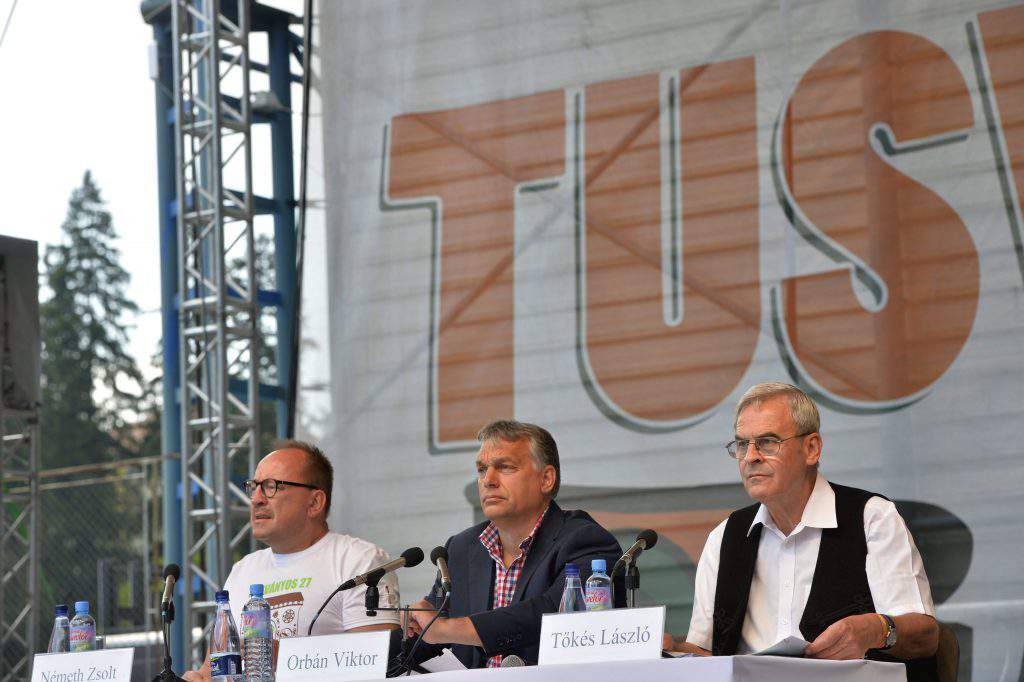Orbán in Romania: Time to give nation states primacy

Baile Tusnad, Romania, July 23 (MTI) – All types of political initiative and action that take power away from the nation state must be stopped, Prime Minister Viktor Orbán said in a keynote address on Saturday.
Speaking at the 27th Baile Tusnad (Tusnádfürdő) summer university in central Romania, Orbán said that the suppression of national sovereignty in favour of European powers is one of the biggest dangers in today’s Europe.
The prime minister said that it is time to abandon false self-assessments. Britain’s decision to withdraw from the European Union has put a full stop at the end of an era in which the bloc had been a global player. The EU is now a regional player; in a positive-case scenario it will be capable of influencing events taking place in its vicinity, but otherwise it will gradually lose even this ability, he said.
It is time to stop idealising Europe, Orbán said, adding that Europe’s leadership had failed. They are incapable of protecting their own citizens or their own external borders, he said.
Referring to yesterday’s tragic events in Munich, Orbán said, “We have to preoccupy ourselves more and more and increasingly forcefully with security matters.”
Orbán said he could not have put it better than the Republican presidential nominee, Donald Trump, when he identified what kind of steps are needed to be taken in the fight against terrorism. He said that national security agencies in Europe must cooperate and undertake to create the best possible secret-services system in the world.

MTI Photo: Zoltán Máthé
In a Q and A, Orbán said that NATO membership was “a good thing” and brought security for Hungarians, and from the point of view of providing a security umbrella for central and eastern Europe, it was vital. At the same time, as the British step away from the EU, the military strength of the bloc will drastically weaken, he said. “We cannot remain militarily in this vulnerable position.” For this reason a European armed forces should be established, providing a “genuine joint force, with real joint interests, a common language and a common structure”. National budgets should be reconsidered, and military industry must be incorporated into the economic-policy thinking.
Orbán said the “export of democracy” must be stopped. “If we continue to put the export of democracy to the forefront in place of stability in regions where the success of this outcome is extremely doubtful, then we will not build democracy but we will cause instability,” Orbán said.
He added that Hungary has the greatest expectation of stability as opposed to Turkey. “If Turkey also becomes instable then many tens of millions of people will descend on Europe from that region without limit.
He insisted that there was a crisis of the elites and a crisis of democracy in Europe and the western world.
Europe’s right- and left-wing leaders, over 50-60 years, always came from the same circles, schools and elites, and everyone thought this was natural while they competed against each other and exchanged roles while guaranteeing the growing prosperity of Europe, the prime minister said. In light of the economic crisis, however, there have appeared political interest representations, radical and populist, that go beyond the elite, he said, referring to Trump.
“The problem is that today’s crisis of the elite has turned into a crisis of democracy,” he said.
“The vast masses of people obviously and visibly want something other than the traditional elite propose and do,” Orbán said.
Speaking about European immigration policy and the future of Hungary, he said the US elections had significance. In Hungary today one of the main supporters of migration pressure on Hungary is the United States. Partly this comes from official policy, he said, referring to a statement by President Barack Obama at the recent NATO summit. The Americans think that whoever does not regard immigration as a positive and to be encouraged, summons up the worst of the spirit of the twentieth century. This is the standpoint of the Democrats, and given that the Democrats are in power, this is official US policy, he said, adding it was not a matter of indifference as to what the next US president thinks about migration.
On the topic of the Visegrad grouping, he said expanding the V4 would entail risks and therefore it was better to maintain concentric circles with countries “which can give the V4 strength in such a way that they do not to break its homogeneity.
Orbán said he supported the Polish proposal to set up a V4 parliamentary assembly and to work on establishing a joint V4 armed forces which is distinguishable from a European joint military force.
He said that next week he would meet the Austrian Chancellor to discuss the possible presence of Austrian police, soldiers and equipment on the Serbian-Hungarian border.
Photo: MTI
Source: MTI







